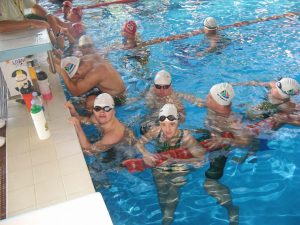 I don’t know about you, but the televised Olympics—both summer and winter—are a special time in my home. If I’m not traveling, Ellen and I are glued to the TV, soaking in the inspiration exuded by the athletes.
I don’t know about you, but the televised Olympics—both summer and winter—are a special time in my home. If I’m not traveling, Ellen and I are glued to the TV, soaking in the inspiration exuded by the athletes.
The Paralympics games follow the Olympics and are currently in full swing. They feature athletes with a variety of challenges. I highly recommend watching nightly coverage provided by NBC Sports.
We were caught by surprise when controversy erupted at the Paralympic games, and it affects a group of individuals near and dear to my heart.
The games are directed by a detailed set of rules which categorize athletes according to their impairment. Before each event the sport-specific criteria and how it is implemented is explained to TV viewers. The formulas usually work, but not always. In this case a segment of athletes has been eliminated from competing in swimming and they’re understandably unhappy.
Down Syndrome Australia is speaking out because they believe their athletes aren’t able to compete on an equal footing. Athletes with an intellectual disability are in one category, however, the average swimmer with Down syndrome also deals with physical challenges, and when competing against competition who are over six feet tall the deck is stacked against them. As a result, they are routinely excluded from participation and the International Paralympic Committee (IPC) has repeatedly been unwilling to create a new category for the athletes.
The swimmers miss out on more than the Paralympics according to Australian swim coach Anna Barnes, “They don’t get any of the recognition, they don’t get any of the funding and they don’t get any sponsorship, they don’t get into [New South Wales] or Australian teams so they don’t get the training camps, the training facilities that the Paralympians get.”

The Down Syndrome World Swimming Championships held in Italy represented 32 countries with over 200 athletes, yet they are barred from advancing to the level of the Paralympic games.
Considering the obvious presence and commonality of individuals with Down syndrome around the world, it is short-sighted at best not to expand the rules to include them. More and more individuals with intellectual challenges are being mainstreamed into society, so it’s impossible for me to understand why the IPC isn’t sensitive to the world around it. You would think a spirit of flexibility would be prevalent in the Paralympic games so that more may participate.
The Paralympics is gaining in popularity because it showcases the world’s best and most talented athletes. Expanding the games to include those with Down syndrome can only enhance its popularity and exposure. Individuals affected by this condition exude a joy and enthusiasm that’s contagious for those watching.
Why is this important to pro-lifers? The increased visibility and mainstreaming of people with Down syndrome will effectively show society that these individuals are a blessing to everyone around them—and that they can be world class athletes. Currently approximately 67% of unborn babies diagnosed with Down syndrome are aborted. This appalling statistic represents so much lost love and blessings to our nation. It must be reversed.
To my friends Down Under, please don’t give up advocating for your swimmers. Someday soon (I hope) the world will benefit by watching their tenacity and talent while being inspired by what they see. And I’ll be cheering from my family room!
Leave a Reply